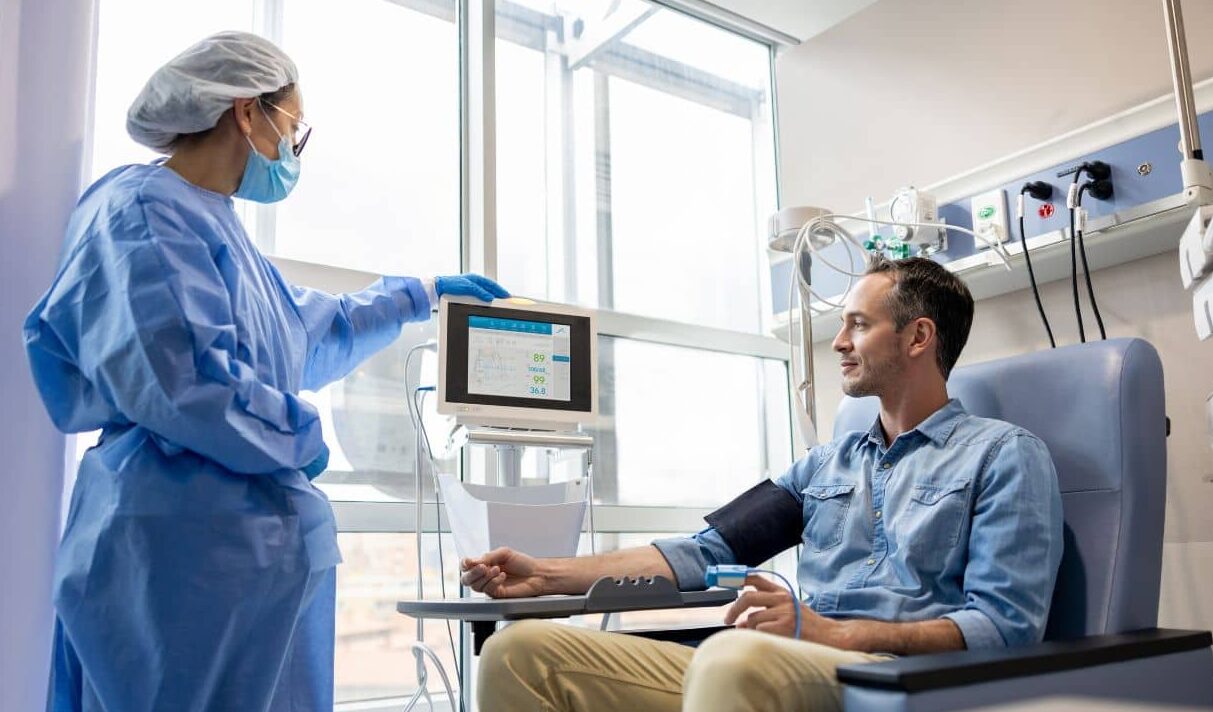-
 News
When glucose levels are low, chemotherapy ceases to affect cancer cells
News
When glucose levels are low, chemotherapy ceases to affect cancer cells
-
 News
Excessive treatment of prostate cancer in older men may reduce quality of life without increasing its duration
News
Excessive treatment of prostate cancer in older men may reduce quality of life without increasing its duration
-
 News
Brain cancer can be cured by viruses
News
Brain cancer can be cured by viruses
-
 News
Ways to reduce lymphatic pain in breast cancer have been found
News
Ways to reduce lymphatic pain in breast cancer have been found
-
 News
Scientists have turned bacteria into a powerful weapon against cancer
News
Scientists have turned bacteria into a powerful weapon against cancer
All news
Rectal cancer treatment
- №2 among all fatal bowel cancers.
- More common in men and people over 50.
Innovative diagnostics: colonoscopy, rectoscopy, sigmoidoscopy, endoscopy, CT, MRI.
Modern treatment: robotic surgical removal, radiation therapy, chemotherapy, radiochemotherapy, targeted therapy, immunotherapy, brachytherapy.
MedTour patients recommend clinics for the treatment of rectal cancer:
Doctors for the treatment of rectal cancer
Patient reviews
Good!
I want to share my experience with Liv Hospital, where I had a prostate removal surgery due to cancer. From the very beginning, everything was well-organized – the staff helped me with all arrangements, and the doctor explained everything in detail. The hospital itself is very modern and clean, which made me feel more comfortable.
The surgery went well, and I was surprised how fast I started recovering. Now, a few months later, I feel much better and my tests show good results. I’m really grateful to the doctors and nurses at Liv Hospital for their professionalism and care. If anyone is looking for high-quality prostate cancer treatment, I can definitely recommend this place.
Frequently Asked Questions
This is the transformation of cells in the wall of the rectum with the formation of a malignant tumor.
There are 4 stages:
- The size of the tumor is less than 1 mm, there are no metastases in the lymph nodes.
- The size increases to 15 mm, but there are no metastases in the lymph nodes.
- The cancer has spread through all the intestinal walls and has grown into connective tissue, 1-4 lymph nodes with metastases.
- The tumor affects other organs and grows into the peritoneum, there are distant metastases.
Risk factors are:
- eating a lot of red meat
- a diet low in fruits and vegetables.
- obesity,
- alcohol abuse,
- smoking,
- elderly age,
- type 2 diabetes mellitus,
- bowel disease (ulcerative colitis).
Signs may include the following symptoms:
- diarrhea and constipation,
- blood in the stool,
- abdominal pain,
- decrease in physical performance,
- unwanted weight loss.
Yes, you can. This type of cancer is the №2 cause of death among cancer patients.
67% of people live for 5 years, but with early diagnosis life expectancy increases.
Used to detect cancer:
- colonoscopy,
- rectoscopy,
- sigmoidoscopy.
Treatment includes:
- surgical removal,
- radiochemotherapy,
- targeted therapy,
- immunotherapy,
- brachytherapy.
International standards for the diagnosis and treatment of rectal cancer
In many cases, rectal cancer is diagnosed at screening. To confirm the diagnosis, imaging methods are used: colonoscopy, sigmoidoscopy.
Colonoscopy
If a patient reports symptoms, they should have a colonoscopy. With this method, the doctor examines the inside of the rectum. The examination is done using a colonoscope: a thin, flexible tube that is inserted into the anus. There is a small chamber at its end. She transmits images from the intestines to the monitor.
Biopsy
If necessary, during a colonoscopy, the doctor takes tissue samples from suspicious areas. Then they are examined under a microscope for malignant changes.
Sigmoidoscopy and rectoscopy
When colonoscopy is contraindicated, less extensive methods are used. During sigmoidoscopy, only the last 30-40 centimeters of the intestine are examined. With rectoscopy, the study is carried out using only a rigid mirror.
Assessment of tumor spread
When choosing the optimal treatment, it is necessary to determine the degree and stage of the tumor. To do this, endosonography is performed – a method of ultrasound examination. In this case, the device is inserted into the anus and the intestinal wall can be scanned from the inside.
Other methods include:
- CT or MRI of the pelvis and abdomen,
- ultrasound of the abdominal cavity,
- X-ray.
If women suspect that cancer may have spread to the uterus or vagina, a pelvic examination is recommended.
Treatment
It depends on type of tumor, risk of spreading the disease, and general condition of the patient.
Surgical intervention
The goal of the surgery is to remove as much cancerous tissue as possible from the body. For this, partial (upper third) or complete (middle and lower third) mesorectal excision is used. This removes not only the tumor itself, but also the surrounding lymphatic vessels.
Operation options:
• removal from the inside of the rectum,
• removal of cancer along with part of the rectum,
• removal of rectum and anus including.
Radiation therapy
The tumor itself and the surrounding lymphatic pathways are irradiated. Patients are often advised to take a course before surgery. This increases the success of the surgery and reduces the risk of recurrence after the procedure.
Chemotherapy
This method uses active substances to influence cancer cells. Doctors usually recommend taking this course after surgery to kill any remaining cancer cells. The innovative clinics use HIPEC hot chemotherapy.
Radiochemotherapy
A course of this kind of therapy is prescribed before surgery for large and locally more advanced tumors. It can significantly reduce the size of the tumor before surgery. Current protocols recommend 5-fluorouracil (5-FU), an effective and well-tolerated chemotherapeutic agent.
Targeted therapy
Targeted therapy is aimed at slowing the growth and reproduction of cancer cells. For metastatic cancer, it is usually used in combination with chemotherapy. Medicines used:
• bevacizumab,
• cetuximab,
• panitumumab.
Immunotherapy
The drugs activate the human immune system. As a result, the body increases the number of cells that can recognize and destroy cancer cells.
Brachytherapy
This method uses radiopharmaceutical capsules. They are injected deep into the tumor and destroy the tumor from the inside. The main advantage is no effect on healthy tissues.
Published:
Updated:


Information on this webpage verified by the medical expert









Does Ralf buhl also remove brain lipomas?